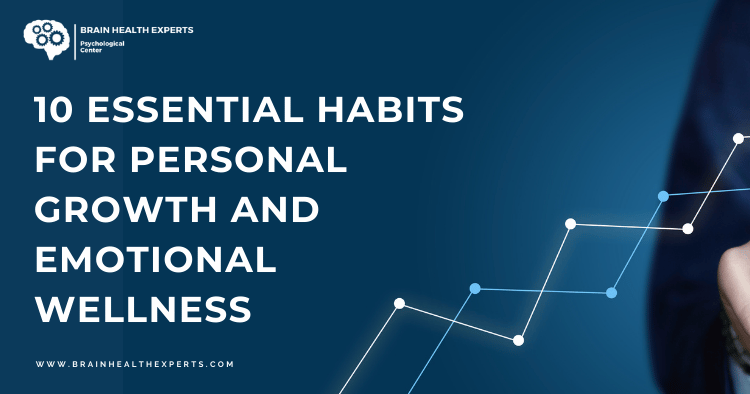Habit 1: Practice Mindfulness
Mindfulness is the practice of being present in the moment, which can significantly improve your emotional well-being. By focusing on the here and now, you can reduce anxiety and increase your overall happiness.
How to Practice Mindfulness:
- Meditation: Spend a few minutes daily meditating. Apps like Headspace and Calm can guide you.
- Deep Breathing: Take a few moments to focus on your breath. Inhale deeply for four counts, hold for four, and exhale for four.
Benefits of Mindfulness:
- Reduces stress
- Increases emotional regulation
- Enhances self-awareness
Mindfulness techniques can create a space for peace amidst the chaos of daily life.
Also look for more mindfulness techniques in our article on 10 Mindfulness Techniques to Reduce Stress Effectively.
Habit 2: Foster Positive Relationships
Healthy relationships are crucial for emotional wellness. Surround yourself with supportive friends and family who uplift you and encourage personal growth.
Tips to Foster Relationships:
- Communicate Openly: Share your thoughts and feelings honestly.
- Spend Quality Time: Engage in activities that strengthen bonds, like cooking or hiking together.
Why Relationships Matter:
- They provide support during tough times.
- They enhance feelings of belonging and self-worth.
Stronger relationships can be the bedrock of emotional resilience.
Learn more about how positive thinking transforms relationships in our article 10 Ways Positive Thinking Transforms Your Relationships.
Habit 3: Set SMART Goals
Setting goals gives you direction and purpose. Make sure your goals are SMART: Specific, Measurable, Achievable, Relevant, and Time-bound.
Example of a SMART Goal:
| Goal Component | Example |
|---|---|
| Specific | “I want to read more books.” |
| Measurable | “I will read one book per month.” |
| Achievable | “I will choose books that interest me.” |
| Relevant | “Reading will improve my knowledge.” |
| Time-bound | “I will achieve this by the end of the year.” |
Benefits of Setting SMART Goals:
- Provides clarity
- Increases motivation
- Enhances accountability
Setting clear goals can illuminate the path to personal success.
For insights on how positive thinking can enhance your goal-setting success, check out 5 Ways Positive Thinking Boosts Goal-Setting Success.
Habit 4: Embrace Lifelong Learning
Continuous learning helps keep your mind sharp and encourages personal growth. Whether through formal education or self-study, lifelong learning opens doors to new opportunities.
How to Embrace Learning:
- Take Online Courses: Websites like Coursera and Udemy offer a plethora of courses.
- Read Regularly: Make a habit of reading books, articles, or listening to educational podcasts.
Lifelong learning is not just a habit; it’s a commitment to personal evolution.
Explore our list of must-read books for personal growth in Top 10 Must-Read Books for Personal Growth.
Habit 5: Prioritize Self-Care
Self-care is not selfish; it’s essential. Taking time for yourself helps recharge your physical, emotional, and mental batteries.
Self-Care Ideas:
- Pamper Yourself: Schedule a spa day or enjoy a relaxing bath.
- Unplug: Take breaks from screens to focus on your well-being.
Importance of Self-Care:
- Reduces burnout
- Improves mood
- Increases productivity
Self-care is the foundation upon which emotional wellness is built.
For more self-care strategies, consider our article on 10 Self-Care Tips to Boost Your Resilience Today.
Habit 6: Journaling for Reflection
Journaling is a powerful tool for self-reflection and emotional processing. It helps you articulate your thoughts and feelings, leading to greater self-awareness.
How to Start Journaling:
- Set a Routine: Choose a specific time each day to write.
- Prompts: Use prompts to get started, such as “What am I grateful for today?” or “What challenges did I face?”
Benefits of Journaling:
- Clarifies thoughts
- Boosts creativity
- Provides emotional release
Writing can be a therapeutic outlet, allowing your mind to roam freely.
For effective journaling techniques, refer to our article on 10 Journaling Techniques to Manage Anxiety Effectively.
Habit 7: Practice Gratitude
Gratitude shifts your focus from what you lack to what you have. Practicing gratitude can significantly improve your emotional health.
Ways to Practice Gratitude:
- Gratitude Journals: Write down three things you’re thankful for each day.
- Thank-You Notes: Express appreciation to those who have positively impacted your life.
A simple act of gratitude can transform your perspective on life.
Explore more gratitude practices in 10 Simple Gratitude Practices to Boost Positive Thinking.
Habit 8: Develop Resilience
Resilience is the ability to bounce back from adversity. Developing this skill helps you navigate life’s challenges more effectively.
How to Build Resilience:
- Stay Positive: Focus on solutions rather than problems.
- Seek Support: Don’t hesitate to lean on friends, family, or professionals during tough times.
Benefits of Resilience:
- Enhances coping skills
- Boosts confidence
- Improves emotional regulation
Resilience is the armor that protects us against life’s storms.
Learn how positive thinking plays a role in building resilience in 10 Ways Positive Thinking Boosts Resilience in Tough Times.
Habit 9: Seek Professional Help
Sometimes, personal growth and emotional wellness require professional guidance. Therapy can provide valuable insights and coping strategies.
When to Seek Help:
- Persistent feelings of sadness or anxiety
- Difficulty managing stress
- Relationship issues
Resources:
- Find a therapist through platforms like Psychology Today or BetterHelp.
Seeking help is not a sign of weakness but a step toward strength and healing.
Habit 10: Engage in Physical Activity
Regular exercise has profound effects on both physical and emotional well-being. It releases endorphins, enhances mood, and reduces stress.
How to Stay Active:
- Find an Activity You Enjoy: Whether it’s dancing, swimming, or hiking, choose something you love.
- Set a Schedule: Aim for at least 150 minutes of moderate aerobic activity per week.
Physical activity is a natural mood booster that benefits the mind and body alike.
For insights on how physical activity impacts mental health, refer to our article on 10 Ways Physical Activity Boosts Emotional Well-Being.
Conclusion
Incorporating these ten essential habits into your daily life can lead to significant improvements in your personal growth and emotional well-being. Remember, change takes time, so be patient with yourself and celebrate your progress.
FAQs
How long does it take to see changes in emotional well-being?
Changes can vary from person to person, but practicing these habits consistently can lead to noticeable improvements within a few weeks.
Can I incorporate these habits into my busy schedule?
Absolutely! Start small and gradually integrate these habits into your routine. Even ten minutes a day can make a difference.
What if I don’t know where to start?
Begin with one or two habits that resonate with you. Once you feel comfortable, you can add more to your routine.
Is professional help necessary for everyone?
Not everyone will need professional help, but if you find yourself struggling, it is a valuable resource to consider.





